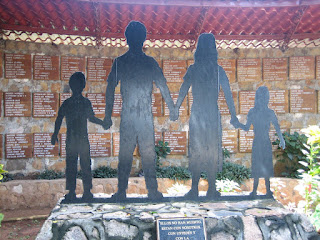International court condemns El Salvador for El Mozote Massacre

Today on the 31st anniversary of the El Mozote massacre, the Inter-American Court for Human Rights ruled against El Salvador and ruled that the country's amnesty law, enacted after the close of the civil war, should not impede investigations of the responsible parties. From the New York Times:
The Inter-American Court of Human Rights has ruled that a 20-year-old amnesty law does not cover war crimes committed during El Salvador’s long civil war. The ruling, which was announced Monday, ordered the government to investigate the massacre in the region of El Mozote 31 years ago and to prosecute and punish those hold responsible. More than 800 civilians, many of them children, were killed by the military in the worst massacre of the war, which began in 1979 and ended in 1992. But Salvadoran courts have refused to investigate the killings, citing a 1993 amnesty law. The regional court’s ruling means that “El Salvador will have to secure truth and justice for the crimes committed during this massacre,” said Viviana Krsticevic, executive director for the Center for Justice and International Law in Washington, which joined with the human rights office of the San Salvador archdiocese to take the case to the regional court.The complete text of the Court's decision, In Spanish, is here. The Court ordered, among other things, the following remedial measures to be performed by the government of El Salvador:
i) continue compiling a Register of Victims and Relatives of Victims of the massacre
ii) perform investigations of the events,
iii) ensure that the Amnesty Law does not represent a obstacle to investigations,
iv) investigate the conduct of officials who obstructed the investigation,
v) conduct exhumations and identification of remains of executed persons,
vi) implementing a development program for the affected communities vii) ensure that victims displaced to return to their home communities, as well as implement a housing program in areas affected
viii) implement a comprehensive care and treatment of physical health, mental and psychosocial problems,
ix) make relevant publications;
x) create an audiovisual documentary on the facts of the case;
xi) implement a permanent and mandatory human rights program directed to the Salvadoran Armed Forces, and
xii) pay the costs of the proceeding.One year ago, on the 30th anniversary of the massacre, the government of Mauricio Funes, accepted responsibility on the part of the Salvadoran state for the atrocity. But the current ruling of the Inter-American court makes it clear that justice for the victims requires much more than just saying you're sorry.
Comments